Biden Leads In Key Iowa Poll, Other Candidates Gain Ground
The latest iteration of a benchmark Iowa poll shows Joe Biden leading, with Bernie Sanders sinking and looking at several candidates closing in on him.
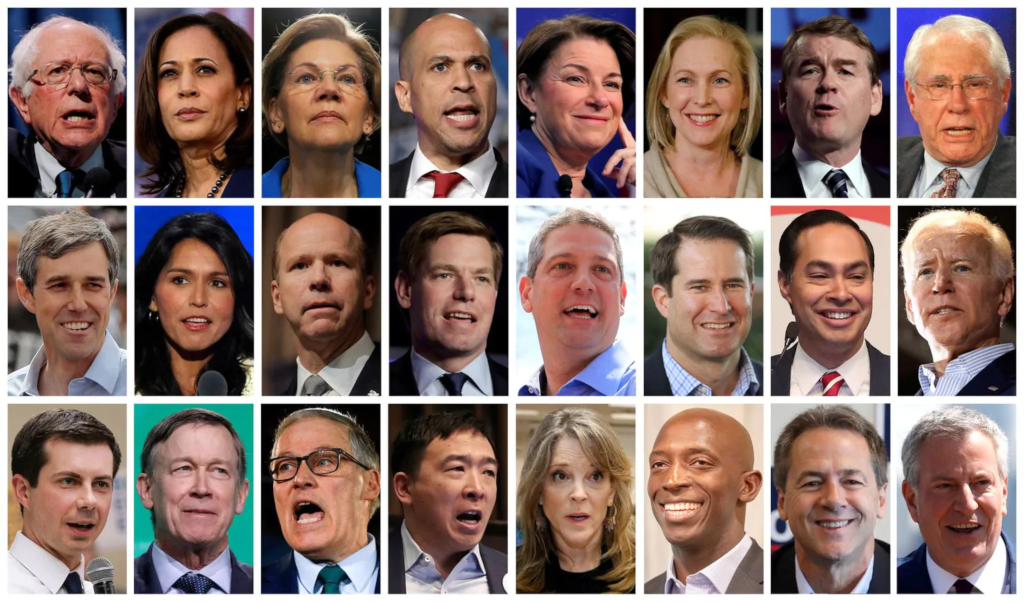
With eight months to go before the 2020 campaign season officially opens with the Iowa Caucuses, the latest iteration of the benchmark Des Moines Register poll, which is being conducted in partnership with CNN for this election cycle, former Vice President Biden is leading as he has been in other Iowa polls with Bernie Sanders in second place, but signs that several second-tier candidates are gaining ground:
CRESCO, Iowa — Former Vice President Joseph R. Biden Jr. retains a lead among likely Iowa caucusgoers, but both he and Senator Bernie Sanders have lost ground over the past three months while Senator Elizabeth Warren and Pete Buttigieg, the mayor of South Bend, Ind., have made clear gains, according to a new poll from The Des Moines Register and CNN.
The poll showed that Mr. Biden is the first choice for 24 percent of would-be Democratic caucusgoers, with three candidates in a virtual tie for second — Mr. Sanders of Vermont at 16 percent, Ms. Warren of Massachusetts at 15 percent and Mr. Buttigieg at 14 percent.
In March, before Mr. Biden formally entered the race, he and Mr. Sanders held a commanding lead, with 27 percent and 25 percent support according to The Register’s polling, which has long been judged by campaigns as the best in the state. At the time, Ms. Warren was polling at 9 percent and Mr. Buttigieg at 1 percent.
Senator Kamala Harris of California was at 7 percent support in both surveys. Senator Amy Klobuchar of Minnesota and former Representative Beto O’Rourke of Texas, both at 2 percent, were the only other candidates above 1 percent in the new poll.
More from CNN:
Joe Biden leads as the top choice of likely participants in the first-in-the-nation Iowa Democratic caucuses, but his advantage there is smaller than the one he has held in recent national polling, even as just five candidates out of a field of 23 crack 5% support.
A new CNN/Des Moines Register/Mediacom poll conducted by Selzer and Co., finds Biden leads among both those who plan to participate in the caucuses the traditional, in-person way, or via a new process for caucusing virtually.
Overall, 24% say they favor the former vice president, with 16% backing Vermont Sen. Bernie Sanders, 15% Massachusetts Sen. Elizabeth Warren, and 14% South Bend, Indiana, Mayor Pete Buttigieg. California Sen. Kamala Harris rounds out the five over 5% with 7% support.
Biden has regularly been above 30% in national polling since announcing his candidacy in April, with his nearest competitor trailing by double-digits. But there hasn’t been high-quality polling in Iowa since his entry to the race.
Most of the historically-large field will be appearing in Iowa Sunday night at a major Democratic Party fundraiser in Cedar Rapids, but Biden will not be among them because of family obligations. He’s expected to visit Iowa on Tuesday, the same day President Donald Trump plans to attend a private fundraiser in the state.
The Iowa poll results combine likely in-person attendees and likely virtual caucusgoers according to the delegate allocation rules the Iowa Democratic Party has submitted to the Democratic National Committee.
Behind the top five, support drops precipitously: Two candidates (former Texas congressman Beto O’Rourke and Minnesota Sen. Amy Klobuchar) land at 2% each, the rest hold 1% support or less.The poll is the first from CNN and the Des Moines Register since the Iowa Democratic Party formally proposed rules for its new virtual caucus. The rules allocate 90% of state delegate equivalents based on the results among those who caucus in-person, while 10% will be based on the results among those who caucus virtually, regardless of the actual number of people who choose to participate each way.
According to the poll, 28% of those who say they are definitely or probably going to participate at this point say they are likely to do so virtually. Although Biden fares better among likely virtual participants (33%) than among likely in-person caucusgoers (23%), combining likely caucus participants’ preferences according to the new rules does not move the numbers meaningfully for any candidate from what they would have been if the 90 to 10 ratio had not been applied.
But those rules could bring a slew of new people to the caucuses next February. Those who say they are likely to participate virtually are more likely to be first-time caucus attendees (52% vs. 17% of those who say they’ll attend in-person), they are more apt to be registered as independents (31% vs. 11% among likely in-person attendees) and they are younger (63% under age 45 vs. 51% among in-person attendees).
Beyond Biden’s lower overall support, the poll also suggests some warning signs for him beneath those numbers. His supporters are less apt than others to say they are “extremely enthusiastic” about him (29% vs. 39% for backers of all other candidates, and 43% among those backing his nearest competition in Sanders, Warren or Buttigieg). He also remains the best-known candidate in the field, suggesting he has less room to grow than other candidates who Iowa’s Democratic caucusgoers are still getting to know.
One of the biggest changes for the Democratic caucuses this year is the addition of so-called ‘virtual caucuses’ that will allow people to attend their local caucus without actually having to be there. This is significant because it addresses one of the biggest criticisms of the caucus format, namely that it requires people to leave their homes in the evening and spend several hours at a caucus location while the process plays out. This makes it difficult for people who work odd hours, or who have children or other responsibilities that keep them home during the evenings, to participate in the nomination process. This reduces turnout, obviously, and makes it easy for a well-organized group of supports of one candidate to overwhelm the caucus process in ways that they’d likely be unable to do in a primary.
While the exact details apparently have yet to be worked out, the basic outline is fairly straight forward and could be a guide for how virtual voting might look in the future. Under the plan that the Iowa Democratic Party released in February, registered Democratic voters will be able to sign up to participate in the ‘virtual caucus’ via either phone or smart device. On these devices, they would be able to rank up to five choices for the party nominee. There would be six caucuses beginning roughly a week before the actual caucuses, apparently, one each day, and participants in a virtual caucus would not be eligible to participate in an actual caucus. The results of these caucuses would be maintained by the Iowa Democratic Party and would be weighted differently than the in-person caucus, accounting for about ten percent of the total with delegates being awarded based on the Congressional District of the participants. This is the first time Iowans will be able to participate in a caucus without actually attending and it will no doubt be closely watched to see how well it works and how it could be applied to other states in the future. More information about the ‘virtual caucus process can be found in a release from the Iowa Democratic Party. [PDF] although it is worth noting that the party has yet to agree on final rules for this new process.
In addition to being an untested innovation that might or might not work properly when actually implemented, these virtual caucuses raise an issue that makes polling the Democratic caucuses in particular difficult. Specifically, it is worth remembering that the Democratic Party conducts its caucuses very differently from the Iowa GOP does.’
Under the GOP rules, caucus participants basically just vote a single time for their preferred candidate, wait for the results to be tabulated and reported, and they are essentially free to go home. This makes it relatively easy to poll Iowa Republicans in a year where the nomination is up for grabs. This year, of course, the Caucuses for the GOP will largely be meaningless.
In the Democratic process, the first round of voting in a caucus is just the first step. After those results are known, caucus-goers and campaign workers spend time trying to convince supporters of a candidate that finished in the back of the pack to support their candidate. After some time for campaigning, there’s another round of voting and the process can continue for as many as two more rounds. This is why the Democratic caucuses can last up three or four hours while the Republican process ends relatively quickly. What this means for polling, though, is that pollsters and those who follow polls of the Democratic race in Iowa need to keep an eye on both the topline number and the questions that try to determine who a prospective caucus-goer might support after the first round if their first choice does not make the cut.
As for this poll, while the numbers come far too early to predict anything about what might happen eight months from now they do reveal some rather interesting trends. The last Des Moines Register poll was taken back in March some six weeks before Joe Biden had officially entered the race and began campaigning in the Hawkeye State. At that time, though, he and Bernie Sanders shared a fairly large lead over the rest of the field, accounting for a combined 52% of the respondents in the poll. While Biden has slipped slightly from where he was in that poll, Sanders has slipped even further and now finds himself fending off challenges from the likes of Kamala Harris, Elizabeth Warren, and Pete Buttigieg. As with other recent polling suggests that Sanders will face a far more significant challenge in 2020 than he did in 2016 when it was basically just a two-person race between him and Hillary Clinton.
There are several takeaways from this poll that CNN points out in its summary:
- ” Among likely in-person caucusgoers, only five candidates were in active consideration by a majority: Biden (61%), Warren (61%), Sanders (56%), Buttigieg (52%) and Harris (52%). The next closest candidates were under active consideration by about 4 in 10: Cory Booker at 43% and O’Rourke at 39%. Among potential virtual caucusgoers, the picture is similar. “
- “Thirteen of the 23 tested candidates are under consideration by fewer than 2 in 10 in either group, that includes both candidates who have won election statewide (Jay Inslee, John Hickenlooper, Michael Bennet, Steve Bullock) as well as those who are making outsider bids for the nomination (Andrew Yang, Marianne Williamson, Wayne Messam). “
- “Outside of candidate preferences, about two-thirds of likely caucusgoers, regardless of how they plan to participate, say they would prefer that the winner in Iowa be someone with a strong chance of beating Trump over a candidate who shares their views on major issues.
But when asked to choose among desirable qualities in a candidate, electability ranked fourth on a list of seven for both sets of possible caucus participants. A majority in both groups named integrity a top trait (56% among in-person, 61% among virtual), and 40% in each chose intelligence. Just over a third in each group picked leadership (34% in-person, 36% virtual) and about a quarter picked electability (25% in-person and 23% virtual).”
While this bodes well for the candidates in the first and second tiers in the polls, it is sobering news for the candidates in the third tier and below. Essentially, these candidates are going to have a limited at best opportunity to prove themselves in Iowa and nationwide before people are going to basically stop paying much attention to them. Those opportunities will come in the first respect in the two upcoming debates in June and July, to the extent they even qualify for the debates at all. If they don’t show at least some momentum, then they are going to find breaking through in a field of 23 candidates as difficult as many Republican candidates did in 2016.
Looking at the RealClearPolitics average for Iowa, we find little change from where it stood the last time we looked at it. One reason for this is that the poll released last night is the first poll of the Hawkeye State released in nearly eight weeks. In any case, in that average Joe Biden (23.8%) is leading Bernie Sanders (18,8%) by 5 points. Sanders, meanwhile, is finding himself looking in his rearview mirror and seeing several second-tier candidates gaining on him. Immediately behind Sanders, there’s Pete Buttigieg at 12%, Elizabeth Warren at 9.8%, Kamala Harris at 7.5%, Beto O’Rourke at 4.5%, Cory Booker at 3.5%, and Amy Klobuchar, the Senator from neighboring Minnesota, at 3.0%. All of the other candidates are under 2%.
With these results we can divide Iowa into basically three tiers:
- A first tier consisting of Biden and Sanders, with Pete Buttigieg threatening to get closer to Sanders and become part of that tier. Indeed, Buttigieg is one of only three candidates averaging double digits right now, which arguably could put him in the first tier already;
- A second tier consisting of candidates polling between 10% and 3% that consists of Elizabeth Warren, Kamala Harris, Beto O’Rourke, Cory Booker, and Amy Klobuchar; and,
- A bottom tier that consists of all the candidates polling below 2%. One could further rank this tier but it hardly seems worth the time and effort at the moment.
As I said, with eight months to go before the Iowa Caucuses, these numbers are not very meaningful taken on their own. As with any other poll, they are merely a snapshot of what the electorate looks like right now for the Democrats. In that respect, there is good news for Biden as well as for candidates such as Buttigieg, Warren, and Harris who are gaining on Sanders and could soon have a legitimate claim on second place and a place among their first tier candidates. There’s bad news for Sanders in that this is yet another poll showing him losing ground to Biden while a pack of candidates continues to gain on him steadily. And there is even worse news for the candidates who are at the bottom of the pack who will have to show evidence that they can be viable before people basically stop paying attention to them.

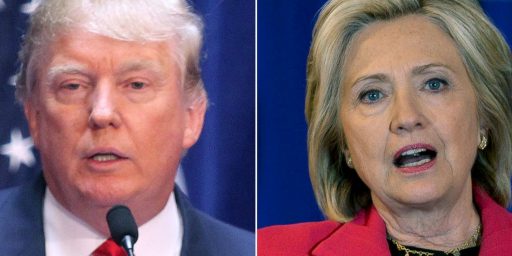
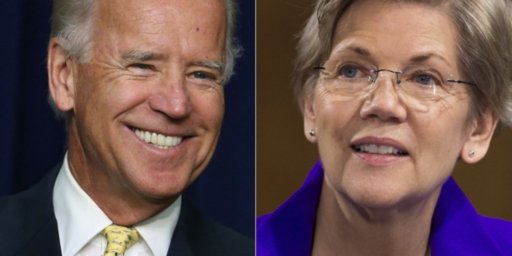

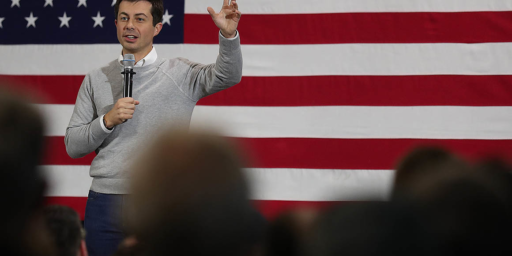
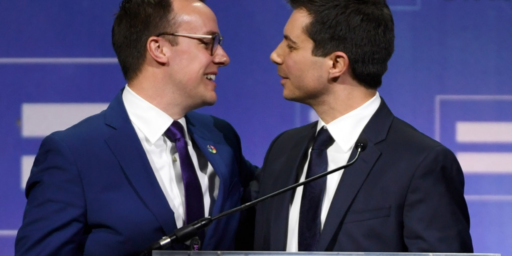
The front page graphic and the graphic at the top of this page are slightly different.
Given that most people are considering several candidates at this point, this Des Moines Register graphic seems a better depiction of the current state of the race:
https://pbs.twimg.com/media/D8lGsYGWwAEFU0v.jpg
Bernie Sanders seems to be one of those people that everyone either loves or hates, with no one being so-so. That translates into him being a rather Trumpian candidate, with a high floor, but also a low ceiling.
@Stormy Dragon: agreed, and yet another color to include “would be acceptable to you” would be interesting information.
I think that South Carolina might be most interesting than Iowa. I think that the whole Cherokee/DNA test will not work well for Warren among African-American voters and we need to see if just being the moderate White friend of Barack Obama might be enough for Biden.
@Teve: I think the third option “actively considering” is a pretty good proxy for that.
Based on the rules presently under consideration at most 10% of the delegates would be allocated from the “virtual caucuses”. Shorter: they won’t be a major factor in the outcome.
Since Iowa is a caucus state you can’t tell much from an opinion poll. As I noted over at my place, caucuses are not contests between candidates but between candidates’ organizations. Predict the likely outcome in Iowa accordingly. Union endorsements will be key.
@SKI: you’re right that it might be but it might not, I just don’t know. I wouldn’t say I’m actively considering Cory Booker or Kirsten Gillibrand, but if either one of those two gets the nomination a year from now I would fight off a pack of direwolves to vote for them in the general.
It’s outrageous that the DNC is once again sabotaging Bernie’s campaign by allowing other candidates to run.
I would be ok with this being our top tier.
I’m disappointed that Booker and Gillibrand have not been catching attention of anyone, and the more I hear about Bullock, the more I think there’s a track for him — not my favorite but someone I could see other people liking and I would grudgingly accept. But, I’m ok with the top five.
I don’t want Sanders, and I’m not sure I want Biden, but they fall neatly into the “I may be entirely wrong about the mood of the country so I’m glad they are there” category.
Buttigieg continues to surprise me by not imploding. He should be the flavor of the month, and he has gone on way longer than that. I really like him though.
And, after seeing that picture of him in the airport bumping into Beto O’Rourke, I think this might be his moment, not in another decade once he gets more experience. I have a sneaking suspicion that he will suddenly become Michael Dukakis on his 45th birthday.
I caught Warren’s town hall on Chris Hayes last week, and it reminded me of how much I really like Elizabeth Warren. If she can get people to hear her, she is amazing.
If Buttigieg does collapse at some point, she should hire his entire media team. Maybe him too. And definitely Chasten and the dogs.
@Gustopher: Liz Warren is the bee’s knees. I wouldn’t be surprised if she became the front runner.
1. I’m in the “Anyone but Bernie” camp.
2. Love Warren, but fear they’ll “Clintonize” her. I don’t know how well she’d do heads up against Trump.
3. Bullock should run for Montana Senate Senate seat. He’d have a good chance of winning.
4. Julian Castro should take on Cornyn for the Texas Senate seat. He’s not going to be the nominee.
5. Buttegeig will get a nice bump in his national profile, and should be a formidable 2022 candidate for the Indiana Senate race in 2021. In fact, I wouldn’t be surprised if this is the long term plan already.
6. Some of the candidates (Yang, Gabbard, Inslee, Klobauchar, Messam, Moulton, Inslee, Williamson, Swallwell, Ryan, Delaney) need to exit stage left, sooner rather than later.